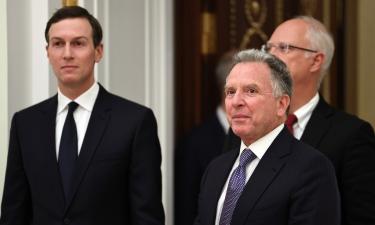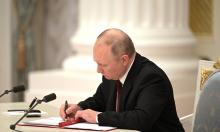Military Men Die in Chechnya. Who is Guilty?
Lieutenant Colonel Anatoly Kudyakov had to become a scapegoat for the downed Russian helicopter
It took the Russian Office of the Military Prosecutor long to investigate the emergency that happened on Khankala airbase in Chechnya. On August 19th, Chechen gunmen downed a Russian Mi-26 helicopter with 127 military men aboard. Only one man found himself at the bar - commander of a separate helicopter regiment, Lieutenant Colonel Anatoly Kudyakov. He has been charged on two paragraphs of the Criminal Code - "breaking flight rules" and "negligence." The lieutenant colonel can be jailed for up to ten years.
Preliminary hearings on the case took place last Friday in the city of Rostov-on-Don. Presiding judge Igor Averkov said, the session would be closed. Judge Averkov and prosecutor Vladimir Gabov were trying to convince Kudyakov to plead guilty and agree for the amnesty. The defendant refused, and the judge decided to hold a court session on the case on August 21st, 2003. Anatoly Kudyakov gave an interview about the case to the 7C newspaper.
What is happening in your life now?
Nothing has changed in my army life. I am the deputy commander of the flight training regiment, I continue training the men. No one has dismissed me from those positions. It is hard for me to deal with such things from the moral point of view. I have been involved in the investigation for eleven months already. I have been accused of many things during that time. They even accused me of contacting guerrillas, thinking that I could have informed them of the helicopter's flight. Investigator Sergey Barsukov was trying to convince me to write an application to close the criminal file for the amnesty. I satisfied his request, albeit with a different ending: "in connection with newly-revealed circumstances." I understand that they just need a scapegoat, but I will not agree upon that role, I am determined to prove that I am not guilty.
What do you mean when you say "newly revealed circumstances?"
Law-enforcement bodies detained the gunmen that had shot the Russian helicopter down. They testified. One of them, named as Jantemirov, told investigators, how he had delivered missile complexes to Grozny. He brought them from the republic of Ingushetia. On August19th, 2002 Jantemirov was driving around the city the whole day until the gunmen took a position on the outskirts of the city at 4:00 p.m. Jantemirov loaded the weapon, and another terrorist, Aslakhanov, fired it. They filmed everything on a video tape. Terrorists say, they did not know it was a MI-26 helicopter flying from Mozdok - they did not care, which aircraft to down. I do not really believe that - there are too many coincidences. I wrote that application because the guilty people had been found, so I thought I would be exculpated. Investigator Barsukov promised to do that, but he did not keep the promise.
Your charges include negligence. What can you say about it?
It is a paradox. Investigator Barsukov said, I had been informed about the fact of terrorists' possession of anti-aircraft emplacements, so I should have taken all security measures. This seems to be delirious: a flight regiment commander should catch bandits in Grozny. There are other people and services for it. As far as security measures are concerned, guerrillas continue downing aircraft, and the situation is not going to improve until we find the source, where anti-aircraft emplacements are delivered to terrorist groups from.
What was happening on August 19th?
That day I conducted all usual procedures in the morning. Major Oleg Batanov was ordered to transport military men from Mozdok. He left there at about 11 o'clock. The crew was rather experienced, it did not need any additional instructions. When Mi-26 was approaching Khankala, I was at the command post, listening to the radio conversation between the crew and the flight command. In several minutes, I saw Mi-26 in smoke - the helicopter crashed 400 meters far from the Khankala airbase. We quickly determined that the plane had been downed. I was charged in about two months. I cannot understand, what I had to do with the helicopter in Mozdok - I was in Khankala. There were enough commanders in Mozdok.
After the tragedy, Defense Minister Sergey Ivanov issued an order about punishing the guilty people. Did you suffer from it?
That order fired me and chairman of the aviation command, Colonel Kelerman, from the Armed Forces. I think that the order was issued to report the work to the president. In addition, the order to appoint me for the position of the commander of the helicopter regiment in Khankala does not exist. It just so happens that I was working there on my personal initiative. Yet, the criminal case mentions me as the helicopter unit commander. The stressful situation has already shown a negative influence on the unit: five experienced commanders left, not to mention young men.
Do you think it is worth keeping the position after so much of stress? Maybe, it is better to retire?
I am in my late thirties, it is shameful for me to retire at this age. I am not a pensioner, I have energy, so I will fly. On the other hand, I have a feeling that the state does not need us. Judge Averkov is telling me that if I had refused to go to Chechnya, nothing would have happened to me. This is a strange position for a judge.
Alexander Tolmachev
Subscribe to Pravda.Ru Telegram channel, Facebook, RSS!




